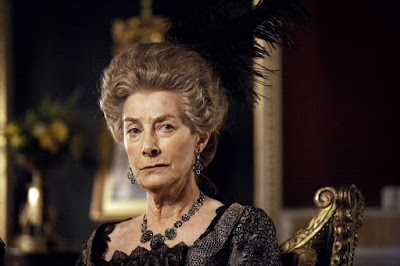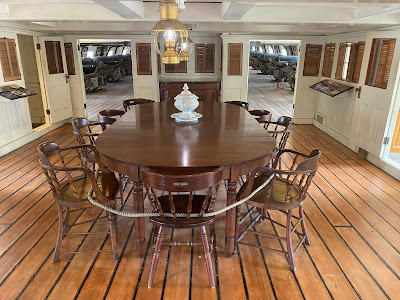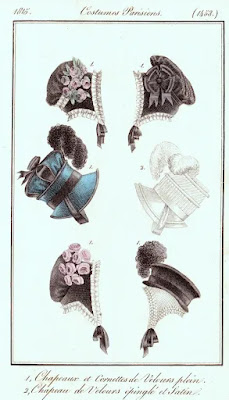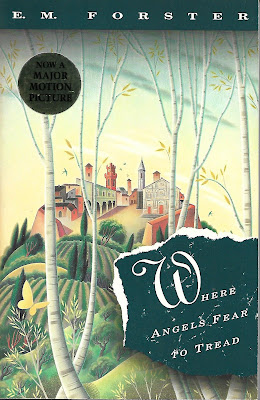My Writing
- Being Mrs. Bennet
- Darcy in Wonderland
- The Madness of Mr. Darcy
- Tales of Less Pride and Prejudice
- And Who Can Be in Doubt...
- Twisted Austen
- Other Fiction
- Movie Mashups
- Pride & Prejudice Analysis
- Character Profiles
- Frances Hodgson Burnett
- Georgette Heyer
- A Catalogue of My Ramblings
- Book & Film Reviews
Tuesday, November 29, 2022
Monday, November 21, 2022
NaNoWriMo 2022 Update
Back to it. Happy Thanksgiving to those celebrating this week. We're doing it up Swiss style, with fondue and Christmas markets. Until next time ...
Monday, November 7, 2022
NaNoWriMo 2022
It will be in the same vain as Darcy in Wonderland, only my Alice is older than Carroll's is in Through the Looking-glass. I don't want to go into too much detail now (need to writing it, not about it), but here is a small taste. I'm enjoying delving into a poetic parody again:
Monday, October 17, 2022
Hardy Har Har
[Mrs. Ferrars'] complexion was sallow; and her features small, without beauty, and naturally without expression; but a lucky contraction of the brow had rescued her countenance from the disgrace of insipidity, by giving it the strong characters of pride and ill nature. - Sense and Sensibility
Halfway through fall break. Daydreams of writing have failed to materialize into anything tangible, but my eldest told me a cute joke which, unaccountably, reminds me of Mrs. Ferrars' furrowed brow. It's a trait I unfortunately share, as I can't help but frown when I concentrate. My kids do it, too, as did my father and grandmother before me. On the bright side, no one has ever accused any of us of insipidity.
What did the zero say to the eight?
Nice belt.
A lovely week to you all.
Monday, October 10, 2022
That will do extremely well, Mary. You have delighted us long enough.
I am far more familiar with synagogues, having been raised jewish, but I have occasionally attended church services, and not just for funerals and weddings. I like observing ritual and find organised religion, even as I don't believe in such institutions, endlessly fascinating. My eldest shares this interest, so it seemed a very natural thing to ask if they wanted to attend a Sunday service and hear their grandmother sing in the choir. They were willing, if not enthusiastic, so we woke up early and went.
It was the funniest service of any denomination I have ever attended.
Now, I don't think the rest of the congregation shared my amusement, but it was all I could do not to laugh my head off. As said, our motivation in attending the was to hear my mother-in-law sing. She's the only regular church goer in the family, and we knew our show of support would be much appreciated. What we didn't account for were the idiosyncrasies of the other choir members. Their numbers were thinned over the course of the pandemic, and several of the remaining choristers were sick that day. Only two members and the director were there to sing. That's ok. Then the "music" began.
Instantly, I found myself transported to the Netherfield Ball. Mary Bennet, in all her glory, was at her instrument. The choir director, who I understand to be a very dear woman, is the only one with a microphone, which sits before the piano, and she sings and plays both loudly and horribly. I never heard a note out of my mother-in-law's mouth. The resemblance to the 1995 version of Pride and Prejudice, in which Lucy Briers captures Mary Bennet so perfectly, was remarkable:
I'm sitting there, a bit of a stranger in a strange land, itching to share the joke with someone, anyone. My child has fully and totally rejected Austen, and I knew they would only scoff at me if I whispered the source of my mirth. So I sat, grinned, and bore it, trying to control myself. The service lasted an hour, and I was about to applaud myself for not being abominably rude, when they began the hymn "Let all Things now Living," which I had never heard before, but the tune I totally recognized: the old Welsh folk song "The Ash Grove." This is the song that Elizabeth Garvie as Elizabeth Bennet plays at the Lucas' in the 1980 version of Pride and Prejudice. I thought I would die of laughter. Fortunately, I had a handkerchief with me, and smothered the noise. I know not what the people behind me thought. Perhaps they assumed I was having some religiously ecstatic fit.
As soon as we got back to the house, I made everyone watch the following clip. Garvie made an excellent Elizabeth, and David Rintoul, I have always felt, looks more like my image of Mr. Darcy than any of the other actors who have taken on the role (read my review of the film here). Enjoy, and please laugh with me.
Monday, October 3, 2022
It's October! Crap!
This is where I am. The prospects look dim. Please wish me luck.
Monday, September 12, 2022
Simple Gifts Take Two
 |
| Mother Ann Lee |
I must first and foremost note that the visitor experience to Shaker Village has altered greatly since I was first there in 2008. The tours are now almost entirely self-guided, a COVID Era innovation, I assume, with the aid of an app. I always find it a little disconcerting utilising such technology in historic preservation locals, but such is our world.
There are still live presentations by the staff, and the quality of the two I enjoyed remained excellent. One was a repeat of my favorite "adventure" on my prior visit: Shaker Music in the Meetinghouse. This was led by a different woman than last time, but I was equally impressed with the mighty voices of both, beautifully demonstrating the fabulous acoustics of the room. There were not many attendees on a rainy Tuesday morning (this was the week of this summer's Kentucky floods), only ourselves and two other people. The leader was great, incorporating my restless four year old into a demonstration of a children's dance, and providing a lot of fun facts I did not previously know, like anecdotal evidence that the Shakers could be heard seven miles away, where their stomps sounded like gunshots (to view a reenactment of a Shaker meeting, please see my previous post), and stories of just how disruptive the Shakers were in merry old England before immigrating to the American colonies shortly before the Revolutionary War.
Readers of Austen should have great appreciation for stories of Mother Anne Lee, considered their messiah by members of the United Society of Believers in Christ's Second Appearing, which is the proper name for those now commonly known as Shakers. Imagine a very orderly Church of England Sunday service, the likes of which any of the many clergymen in Austen's novels might have led, being invaded by Mother Anne and her followers, determined to disrupt and shout over the proceedings to their best ability. Can't you just see Mr. Collins' befuddlement and Lady Catherine's outrage? I had to laugh.
These anecdotes aside, what most impressed me was how the speaker, a Black woman, handled a very uncomfortable moment with one of the other attendees. The person had asked how the Shakers handled slavery, a very reasonable question. A cautious but rehearsed reply was provided, detailing the mixed legacy of the Shakers on this subject, who were implicitly anti-slavery but nevertheless participated in the local, slave-owning economy. The community had lots of seasonal visitors, perhaps particularly during the Civil War. Some of these needed food and shelter, but others were contemplating joining the Shakers. This required giving up all your personal possessions to the community, who freed all slaves acquired in this manner. The questioner replied: "Oh, that's a real hardship."
I think my jaw dropped. I was prepared for the atmosphere in the United States to have changed (it was already well on its way) over the course of the pandemic and following the reinvigoration of the Black Lives Matters movement due to the horrifying deaths of Ahmaud Arbery, Breonna Taylor, George Floyd, and way, way too many others. And yes, I grew up in a progressive bubble, but I have rarely in my life heard anyone indulge in such blatant racism, particularly in a public venue. Racist expressions, when I did encounter them, were whispered in low voices, because the speaker knew they were shameful. Not that it really makes it any better, but they weren't voiced loudly, in a room with booming acoustics, nor directly addressed to a person who would obviously feel the sting of the words. I spent many years debating political correctness, rightly calling out that it just hid the harm and didn't address it, but I guess it did at least it provided some standard of decent conduct.
My shock aside, what really hit me was how often the presenter must have heard something just like it. She paused but a moment, presumably choking down the hurt, and proceeded on with her delivery. I followed her lead, and bit down my urge to call the person out. It was surely the pragmatic and safest way to respond. But what does that do to a person to have to live with such normalized, casual wounds? I felt these tensions in smaller, less dramatic ways throughout the trip. I read the political signs throughout the country with both hope and horror. I felt the pain of the attacks on my own non-binary kid, in anti-LGBTQ+ billboards and t-shirts, and pride in displays of inclusivity and acceptance. There is a real fight for human liberties underway, and I have to celebrate that, because I want to live in a world where everyone is treated with the respect and dignity they deserve, but the reaction scares me, as is intended.
Though I laughed at her tactics, Mother Anne was amazingly brave.
Later that morning, as we sat down for lunch at the village restaurant, featuring food sourced form their own organic farm (another great tour, if hot in summer), I filled my kids' and mother-in-;aw's ears with my repressed anger and indignation. After summarily denouncing the questioner and having a good, indignant rant, I concluded with the thought, "I bet she's sitting right behind me, isn't she?" I turned around, and sure enough, there she was. What can you do but laugh?
'Tis a gift to come down where we ought to be.
Monday, August 29, 2022
Simple Gifts: The Shaker Village at Pleasant Hill, KY
Note: this is a repost from my "purged" materials, originally appearing on another blog in early October 2015, shortly before that year's JASNA AGM. I share it again now having recently revisited Pleasant Hill. I will share my updated impressions next week. Please enjoy.
 |
| Aerial view of Pleasant Hill |
‘Tis the gift to be simple, ’tis the gift to be freeTis the gift to come down where we ought to be,And when we find ourselves in the place just right,‘Twill be in the valley of love and delight.When true simplicity is gained,To bow and to bend we shan’t be ashamed,To turn, turn will be our delight,Till by turning, turning we come ’round right.– Words and Lyrics by Elder Joseph Brackett, 1848
We receive little hint in Austen of the evangelical and revivalist movements of the 19th century. Mary Bennet is mocked for her religious austerity, but that is about as close as we come. However, the late 18th and early 19th centuries were a boom time for dissenters, or those who interpreted christianity in a manner differing from the Church of England. Unsurprisingly, many persecuted believers found their way to the United States, where they hoped for more religious freedom.
 |
| Amazing stairway designed by Micajah Burnett |
There are a few (like four) Shakers still living in their community at Sabbathday Lake Shaker Village in Maine, but the groups fierce belief in abstinence prevented it from ever becoming mainstream. Shaker men and women, who were considered completely equal within the community and divided all leadership roles, lived in separated communal houses. All property was shared. Everyone worked in the self-supporting communities, as the act of labor was considered a path to god. I’ve always wondered how much abstinence fueled the amazing creations the Shakers produced (need to channel that energy somewhere), for they were incredibly innovative, inventing such things as the first washing machine. The Village at Pleasant Hill is an architectural marvel. Brother Micajah Burnett, who joined the group with his parents at the age of 17, was a self-taught architect who designed the main buildings in the village, using innovative techniques to create large, open spaces, minimizing obstructive beams and supports. The buildings are in amazing condition all these years later. The acoustics in the Meetinghouse he designed are phenomenal. As Shaker worship involves ecstatic singing and dancing, the entire room must have erupted with their voices, clapping, and stomping. Above the main floor of the Meetinghouse was the housing for the village elders: two women and two men.
 |
| Attic of the Meetinghouse designed by Micajah Burnett |
The Shakers were pacifists, like the Quakers, and were the first religious group to receive an exemption form military service during the Civil War. Though they were anti-slavery, they tended to both Union and Confederate forces who found their way to the communities. There were many African-American members, who were considered and treated as true equals in a time when even the staunchest abolitionists tended to believe in white superiority. As the members did not have children (unless the family joined as a unit), foundlings and orphans provided population stability. At age 21, members could choose to stay or remain. Most chose to leave, for no matter how prosperous and harmonious life was in the Shaker Villages, abstinence always has and will be a hard sell.
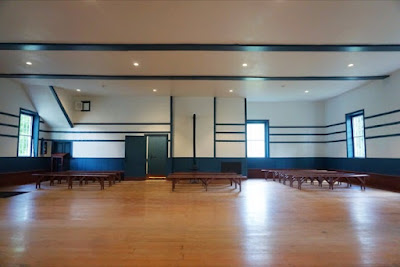 |
| Simple and open interior of the Meetinghouse |
Monday, August 22, 2022
Thoughts of Persuasion: Touring the USS Constellation
 |
| Amanda Root and Ciarán Hinds in Persuasion, 1995 |
"Oh! Frederick! But I cannot believe it of you. --All idle refinement! --Women may be as comfortable on board, as in the best house in England. I believe I have lived as much on board as most women, and I know nothing superior to the accommodations of a man-of-war. I declare I have not a comfort or an indulgence about me, even at Kellynch Hall," (with a kind bow to Anne), "beyond what I always had in most of the ships I have lived in; and they have been five altogether." - Persuasion"If you had been a week later at Lisbon, last spring, Frederick, you would have been asked to give a passage to Lady Mary Grierson and her daughters."
"Should I? I am glad I was not a week later then."
The Admiral abused him for his want of gallantry. He defended himself; though professing that he would never willingly admit any ladies on board a ship of his, excepting for a ball, or a visit, which a few hours might comprehend.
"But, if I know myself," said he, "this is from no want of gallantry towards them. It is rather from feeling how impossible it is, with all one's efforts, and all one's sacrifices, to make the accommodations on board such as women ought to have. There can be no want of gallantry, Admiral, in rating the claims of women to every personal comfort high, and this is what I do. I hate to hear of women on board, or to see them on board; and no ship under my command shall ever convey a family of ladies anywhere, if I can help it."
This brought his sister upon him.
 |
| Captain's Quarters, facing the stern |
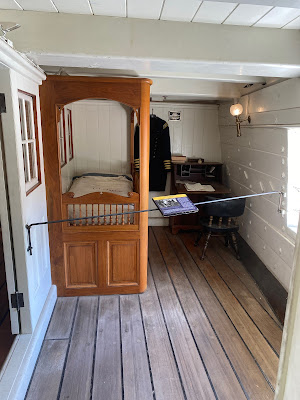 |
| Captain's Berth |
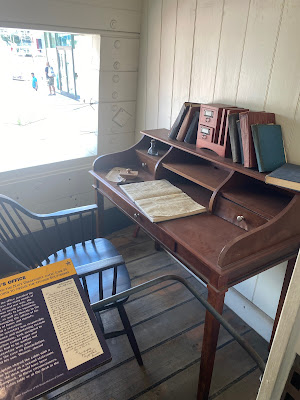 |
| Captain's Study |
presence of a larger family onboard (just touring the ship with two kids was a challenge). And what of women who did not have the gentility to be deemed "ladies?" I doubt anything but the most extraordinary of circumstances would land one aboard. Should such a thing occur, perhaps a gallant captain would still provide her with those protections granted to a female of higher class, otherwise she would be in for a harrowing experience, indeed, and perhaps would have even preferred to remain marooned on an island, or wherever she came from, than endure it.
Monday, May 2, 2022
The Most Fabulous, Ugliest Bonnet in the World
 |
| Hannah More, NPG, London |
Florence has such amazing stores. It was by accident that I stumbled into my favorite discovery of the trip. It says something unsettling about me that I was more thrilled by finding the ugliest bonnet it has ever been my absolute pleasure to behold than by the treasures of the Uffizi, combed over the day before, but what a cappellino!
The store is called Antiquariato il Cancello and is located in the Via dei Fossi, 13/r (www.antiquariatoilcancello.com). It is a tiny place packed to the brim with vintage pieces and, amongst them, some truly historical finds. Something perverse in me prevented my taking pictures, but the particular bonnet in question was so tattered already that I could not bear to subject it to anything more. I suspect it ought to be in a museum collection (if any conservators are in the position to rescue it, you'll find it just inside the shop entrance on your left).
It might be later than I suspect, Italian fashion not being my specialty, but my gut tells me it is an 1820-30 creation. It is a mourning bonnet with a good amount of embellishment, all sadly decaying, and of a poke style that I particularly dislike, close fitting and seeming to reach around the wearer's face like a collar, a la Hannah More above. I have been scouring the internet trying to find an image of something that does it justice with little luck. Instead, I ask the reader to use their imagination:
Cross this bonnet,
with these,
then trim it up like this,
and now give it to a ghost to wear for a century or two.
It was dreadful. Dreadfully magnificent. I do hope someone finds it the right home.
Other treasure stumbled upon include some beautiful parasols and a few late 19th century gowns, but the bonnet brought tears to my eyes. Oh, the things it's seen! Boggles the mind and sparks the imagination.
It is so wonderful to travel again,
Monday, March 21, 2022
Rambling Reflections
 |
| Watercollor by C.E. Brock, mollands.net |
"Come, Miss Morland, let us leave him to meditate over our faults in the utmost propriety of diction, while we praise Udolpho in whatever terms we like best. It is a most interesting work. You are fond of that kind of reading?"
"Yes, I am fond of history."
"I wish I were too. I read it a little as a duty, but it tells me nothing that does not either vex or weary me. The quarrels of popes and kings, with wars or pestilences, in every page; the men all so good for nothing, and hardly any women at all -- it is very tiresome ..."
Tiresome, indeed. It is strange that so many of humanity's most beloved stories should be about war, when war makes for such bad narrative. Readers will raise an outcry when a fictional character's behavior is unexplained or erratic, but reality is often unexplainable. The mayhem of war has no carefully sculpted story arc to cling to. It is perfectly senseless - an exercise in stupidity - and utter chaos.
Oh, how I loathed military history as a child.
Northanger Abbey was my first Austen novel, read at an age when I had no ability to appreciate it, but I liked it well enough to seek out more Austen (I had read most of her novels before the age of 13). I don't remember many of my impressions from that first introduction, but I do remember the scene quoted above and feeling in perfect agreement with Catherine's assessment of history. It was precisely how I felt about what I had already taken to differentiating as military history, a quite distinct field of study from the social history with which I was totally enthralled (the very reason I was reading an 18th century novel in the first place). Austen, despite my incomprehension, offered me a window into how people lived in bygone times. I loved her stories of common concerns and daily life. I did not like endless descriptions of battles and tales of the worst things that humans have ever done to each other.
I think I possessed some modicum of real wisdom as a child. The present and the future have enough horrors on offer and in store. Like Catherine Morland, I studied military history "as a duty, but it never revealed anything that didn't either vex or weary me." As a child, I was inundated with it. My grandfather, in whose house my mother and I lived, served in the US Navy in WWII. The room we called "the den," and in which I primarily played, was adorned with period German army helmets, guns, and even a deactivated grenade (it and a bugle I found to be excellent toys - the helmets were too heavy to be fun, and the guns scared me). In Hebrew school, which I attended seven hours a week, my teachers were largely concentration camp survivors. Only a few had those terrifying blue numbers tattooed on their forearms, but they all had stories to tell of childhoods scarred by unthinkable atrocities. Their most prevalent message: this could happen again. This happened to me. This could happen to you. Be vigilant.
I was so fortunate as to be growing up in the United States, largely isolated from the conflicts that my government and those of others waged against each other, across an ocean. I couldn't hear the bombs falling on many of those I now call friends, but I did know they were out there, and I knew that it could just as easily be me, hiding underground, hoping to somehow survive the onslaught. My time to live such history would likely come. Why dwell more than necessary on that aspect of the past?
Not many of my teachers agreed with this perspective. Perhaps it was inevitable, growing up near Philadelphia, that I should spend countless hours wilting away on old battlefields, listening to detailed accounts of each charge and retreat. There is always such an eerie incongruousness between these sunny fields and the blood that once soaked their soil. I hated every moment.
How comparatively peaceful were Austen's drawing rooms and carriage rides! Yet her world was also at the mercy of the "quarrels of popes and kings, with wars or pestilences." Very few of her days were lived in times of so-called peace. Do you think she escaped into the world of her novels, just as much as we, her devoted readers, do now? Pride and Prejudice was an established favorite amongst British troop in the trenches during WWI. It is yet another aspect of Austen's genius: this ability to zero in on the minutiae of daily life and render it thrilling, sweeping the reader out of time and space to a happily ever after ending at Pemberley.
I wish real life were as orderly as a novel. I wish I could analize it in a tidy essay, my conclusions backed up by contextual evidence, but it is impossible. Hubris to try. Instead, I pay attention, try to listen instead of just talk (a lifelong struggle), and concentrate on discovering the same enthusiasm for the minutiae of my daily life as I can in those of Austen's characters. Military history is adding to its gory portfolio nearby. I suppose the time is ripe to dwell on life's simple joys. Maybe I'lll even write about them, and maybe they will then do someone else a little bit of good.
Monday, February 21, 2022
Thoughts composed after rereading Forster's Where Angels Fear to Tread
We were at the same resort two years ago, when COVID was just hitting the news. Having had a lifelong fear of epidemics/pandemics, it had already on my radar for five or six weeks in February 2020, especially when Jack got sick with flu-like symptoms that trip. We were there again last year, masked but unvaccinated. So it felt like we were coming full circle this year, when the Swiss government lifted the vast bulk of regulations on the 17th. The hospitality workers were quite giddy, though still only cautiously hopeful that the end of this pandemic really might be approaching. Everyone is so tired and traumatised. I do so hope that we all find the time to heal.
That simmering optimism was at odds with my reading material (to say nothing of the news cycle, which I did pay some modicum of attention to). I hadn't read any E.M. Forster in a good many years and sort of thoughtlessly threw a copy of Where Angels Fear to Tread in my bag. I was curious to reread an old favorite author, to see how my perspective on his works might have changed with both social progress and age. It is his novel that I had read longest ago and only once, when I was still in high school, and I did not recall much about it. It just so happens to also be his first novel, and I am feeling some temptation to continue through his work chronologically, if I can find the time.Such an endeavor really should be accompanied by a survey of modern literary criticism of his work. I really am not sure what current scholars have to say of him. His glaring imperialism can be incredibly disturbing. It seems amazingly unconscious on his part, his presumption of British supremacy is so thickly woven into his plots. At the same time, his voice is vitally important as one of the very few gay voices represented in the English literary canon, and those same plots, infuriating in their arrogance, tell heartbreaking tales of isolation, fractured identity, and the torture conventional society can inflict on those forced to adhere to its strictures. At the climax of Where Angels Fear to Tread, I threw the book from me and ferociously paced the room, weeping hysterically. The pain was so, so raw. How did I not recall it? I must have been far too young to understand what I was reading.
My grand takeaway was a violent warning against overly managing parents, more concerned with reputation than their children's well-being.
Austen also addresses these themes, in the horrors of Eliza William's fate in Sense and Sensibility and Sir Thomas' hubris in Mansfield Park. Such potential simmers in characters like General Tilney of Northanger Abbey, Lady Catherine of Pride and Prejudice, and Lady Russell of Persuasion.
 |
Folie de la fiancée de Lammermoor, Émile Signol, 1850. |
Harriet, meanwhile, had been coughing ominously at the drop-scene, which presently rose on the grounds of Ravenswood, and the chorus of Scotch retainers burst into cry. The audience accompanied with tappings and drummings, swaying in the melody like corn in the wind. Harriet, though she did not care for music, knew how to listen to it. She uttered an acid “Shish!”
“Shut it,” whispered her brother.
“We must make a stand from the beginning. They’re talking.”
“It is tiresome,” murmured Miss Abbott; “but perhaps it isn’t for us to interfere.”
Harriet shook her head and shished again. The people were quiet, not because it is wrong to talk during a chorus, but because it is natural to be civil to a visitor. For a little time she kept the whole house in order, and could smile at her brother complacently.
Her success annoyed him. He had grasped the principle of opera in Italy—it aims not at illusion but at entertainment—and he did not want this great evening-party to turn into a prayer-meeting. But soon the boxes began to fill, and Harriet’s power was over. Families greeted each other across the auditorium. People in the pit hailed their brothers and sons in the chorus, and told them how well they were singing. When Lucia appeared by the fountain there was loud applause, and cries of “Welcome to Monteriano!”
One can almost feel sorry for Harriet (but not really).
These were the literary musings that entertained me while on holiday. I wish I had been able to read more. We are supposed to go to Florence this spring ... A Room with a View might prove irresistible in its temptations.
I had better hurry up and find those modern essays on Forster. Any suggestions?
Monday, January 31, 2022
Random Reflections on the Bigg-Wither's Affair
How often I imagine how very different Austen's life (and, subsequently, my own) would have been if she had maintained her very short engagement to Harris Bigg-Wither. Could she have found a way to maintain a household and family and still write her masterpieces? It seems very doubtful, especially when I can't seem to find the time to write with only two children and all the modern appliances, to say nothing of the godsend that is takeout/delivery to the modern parent in a pinch. Running a household in the early 19th century was so enormously more complicated (though at least the Regency homemaker was relieved the burden of calculating their carbon footprint). I don't see how Jane could have done it, even in a comfortable and well-staffed house such as Manydown Park must have been.
I am immensely grateful that she chose not to marry, though it must have been an awful decision to make. I am also relieved to know that my neglected writing is not so detrimental to literary culture. Such genius is a burden I'm rather happy not to bear.
 |
| Manydown Park, 1833 |
And I should have been very much surprised had either of my daughters, on receiving a proposal of marriage at any time which might carry with it only half the eligibility of this, immediately and peremptorily, and without paying my opinion or my regard the compliment of any consultation, put a decided negative on it. I should have been much surprised and much hurt by such a proceeding. I should have thought it a gross violation of duty and respect. You are not to be judged by the same rule. You do not owe me the duty of a child. - Sir Thomas Bertram, Mansfield Park
She is a very headstrong foolish girl, and does not know her own interest; but I will make her know it. - Mrs. Bennet, Pride and Prejudice
These are the thoughts that occupy me as I continue to try and get life back into something like a routine rhythm. There is always solace and useful distraction to be found in Jane. What would we do without her?
Wednesday, January 12, 2022
My COVID-19 Saga
It's really difficult to know where to begin.
My husband and I are double vaccinated. We had appointments to get boosters (now rescheduled for next week), but because of the Swiss system of eligibility, we could not have legally gotten them within this country in time to avoid infection. My brother-in-law, who lives in Germany and received his booster just about a week before we got sick, was with us over Christmas, while we were all infected, and repeatedly tested negative.
First my son got sick, and on his birthday, poor little guy, but it did not appear to be COVID. He had a sudden fever which went down quickly with medication and dissipated completely over the next 24 hours. No other symptoms. I wrote this off as another of the many common, mysterious childhood ailments that circulate in nursery schools. Fortunately, everyone was home for the holidays (when everything, including most test centers, are closed here) and not socializing outside the house, anyway. Then my daughter complained about headache, ear ache, and throat ache, but only when she was bored. As she danced about the house the rest of the time, I did not worry. She has a history of anxiety headaches, and she was starting a new school on January 3rd. This seemed the more reasonable explanation for her discomfort. Then, suddenly, my ears started to ache. I thought it could be sinus pressure, but it felt different. More like a dull ache in the ear canal itself than the far too customary throbbing from my sinus cavities. John said he felt off, maybe sick. Alarms were starting to knell in my head, but it was now his birthday, and he seemed to be rallying, so we proceeded with our cooking and feasting plans. Shortly before dinner, I said I needed a quick nap. I pretty much slept for the next 48 hrs. Fortunately, John was not as debilitated as me. He and the kids managed to enjoy a cozy New Year at home sans Mama, and for that I am grateful.
I do not know what variant we had because of the difficulty accessing full testing options over the holidays, but I can tell you what it felt like. It was certainly what is referred to as mild COVID. I had no fever or trouble breathing. It did not feel like the common cold or rhinovirus, to which I'm susceptible. The brain fog, as mentioned, was prevalent, but it wasn't only effecting the clarity of my thoughts. My entire head felt kind of vacuous: a strange sense of emptiness. "Fog" is an inadequate descriptive. The lack of mucous left my nose feeling voided, and the sensation seemed to penetrate outward until it pressed against my skull, causing a dull but constant pain. I had never felt anything like it before, and because of the novelty of the sensation, I pretty much knew exactly what I had before the test confirmed it. After I woke up and rejoined the world, I continued to have short waves of sickness over the next several days, despite otherwise feeling pretty normal. By the end of the week, this had passed, but then, seemingly suddenly, both John and I lost our sense of taste and smell.
This is terribly disconcerting.
I am the buyer and preparer of my children's food. How can I pick out fruit, when I can't even smell sour milk? I also can't tell if they need a bath, or smell smoke from the fire.
The good news is that we seem to be slowly regaining our sense of taste. I can now vaguely taste cheddar cheese (my favorite), when I couldn't a week ago. I can tell if I brushed my teeth or not. All this is a strong indicator that we will recover. I cling to that thought and look forward to the day that I can bring a vast new appreciation to every thing I taste and smell. May it be soon! We're a foodie family. I don't know what we do without that joy in our lives.
Other good news: though my daughter was horribly disappointed to not be able to begin school in person on the 3rd, we found the new school's home learning plan massively superior to what we had before. She was very happy and surprisingly calm when I dropped her off this morning. This afternoon, she takes her first ever school bus ride (they are not common here). She's so excited, and so I am. I can't wait to hear all about it.
So that's the bulk of my saga. To cope with isolation, we went ahead and celebrated Christmas again last weekend. We made gifts for each other and cooked up another feast (which the kids tell us tasted good). We also watched the entire Harry Potter film collection while running about the place on broomsticks fashioned out of old wrapping paper rolls. We had fun, but thank goodness it's over.
Now to start picking up the dropped pieces of my life. I should probably start by taking down the Christmas tree. It's dried to a crisp, and I can't smell smoke.
May 2022 fulfil all my best hopes for it, despite this inauspicious start. I wish you all health, happiness, and Austen galore. Next week ...





